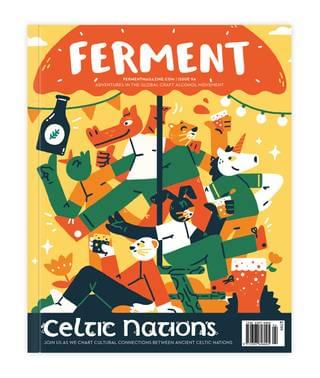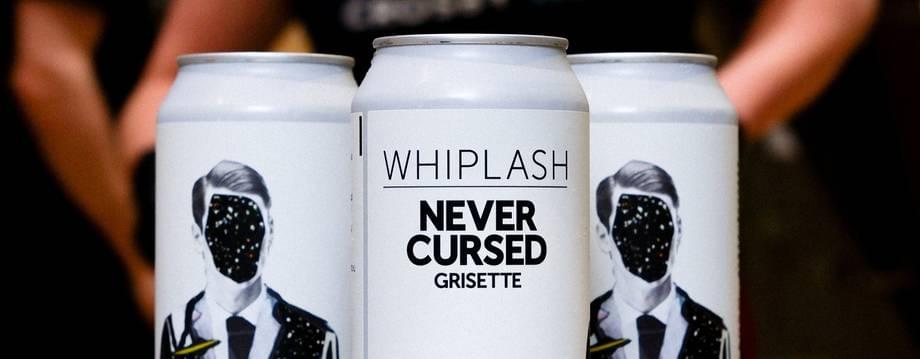Romantic Ireland’s dead and gone?
By opening a bar amidst the tumult of modern Dublin, Whiplash holds space for artisans and creatives in the nation’s capital
Robyn Gilmour
Photos:
Whiplash Beer
Saturday 29 July 2023

This article is from
Celtic Nations
issue 94
Share this article
Throwing open its doors in December 2022, Whiplash’s first bar, Fidelity, oscillates between being a quiet lifeline and the rattling ribcage of a ferocious creativity that courses through Dublin city. Being the lovechild of our favourite Ballyfermot-based brewery, and The Big Romance – an audiophile bar by the minds behind some of Ireland’s most cherished electronic music events – Fidelity is a bar born to celebrate the artistry behind two of life’s simplest pleasures; good beer, and good tunes.
For a first bar, Whiplash has spared no time or expense investing in tap technology that’s on par with the calibre of equipment the brewery has become renowned for around Europe. It didn’t quite cut the mustard that the bar’s sleek array of copper-clad taps were individually calibrated to chill each beer to the temperatures its style calls for; co-founder Alex Lawes has been developing taps that work across a range of gases, can chill a beer to the preferred drinking temperature within five minutes of changing the keg, and from there can be adjusted to a consumer’s preference in real time, and at the flick of a switch.
“It's nice and it's interactive, and it's a solution to a problem that we felt we were the only ones with,” says Alex. When you’re a technical microbrewery, working in a macro-dominated landscape like Dublin city centre, it makes all the difference to have technology on your side that can help emphasise the difference between artisanal beer and its mass produced counterpart. But it’s not only the aggressive commerciality of big beer that’s a challenge for Whiplash, and Irish microbreweries more generally; reckless city planning of a distinctly neoliberal hue is steadily transforming the capital’s industrial pockets – which are both culturally and historically important to Dublin’s identity – into sprawling blocks of hotels.

Alex tells me that when he and co-founder, Alex Wolfe, were first looking for a site to set the brewery up in, they approached a landowner around Dublin’s Victorian fruit, veg and flower market, in Smithfield. “He basically told us, ‘lads, you’re six, seven years too late; all of this has already been purchased for development into hotels and apartments, soon there won't be any kind of warehouse or industrial setting here anymore’. So, in lieu of setting up the brewery where we initially wanted to, we jumped at the chance to base the bar in an area we feel connected to.”
Alex continues: “the first keg of beer we ever sold was to Mulligan Grocer’s just around the corner, and we sold our first cans in a little shop across the road. So we do feel part of the area, and it was important for us to have a base where we feel like we're from”. With privatisation and redevelopment eroding the connective tissue that makes Dubliners feel they belong in, and to, their city, Whiplash is at least determined to do what it can to support fellow creatives. “We've gotten some more space above the pub, and so are doing some work upstairs for artists’ collectives around Dublin. We wanted to help out there simply because this kind of property development isn't very positive for the arts community.”
While things might be hard going in Dublin, there is at least one thing in the city that’s thriving, and that’s Whiplash’s Never Cursed grisette. Alex says they can’t brew enough since it became both a staff favourite and a bestseller at the bar. “People are just smashing through pints of this,” he says, which the optimist might interpret as indication of a growing care, interest and appetite for artisanal beer in Dublin in the years to come.
Grisette is not a particularly well-known style, but its history and character have recruited Whiplash as its champion. “Beers are quite often named after the people who traditionally drank them, and are either city based or agriculturally focused; you have porters for market porters, saisons for les saisonniers [seasonal farm workers], and grisettes were traditionally brewed for female factory workers in the north of France, who wore grey uniforms and would smash a few of these beers after their shift. It’s like a town-based version of a saison.

“I’ve seen a fair few grisettes coming out of a new generation in the US, but they’ve really gone for a sour, aged version of this style. I like to go back to the old recipes fairly often, and when I did I realised that historically grisette was fresh, flowing beer, for cities, it wasn’t sitting in a barrel up the back of a field for six months before being drunk. This would have been bright, hoppy beer with a lower ABV, served in big glasses. The beer was less bitter and focused on malt and wheat instead of just raw wheat. We wanted to do something like that, so we used yeast from La Chouffe brewery, which is our go-to for blondes, tripels and dubbels; we just love that phenolic but not over the top type of character.”
As brilliant as the marriage of bar and brewery is, Whiplash and Fidelity are still just getting to know each other. When I ask Alex if feedback at the bar is shaping the kinds of beers that Whiplash brews, he replies with a good humoured sigh. He tells me the team brewed a nitro Belgian red ale not so long ago, just for the hell of it, to see how it would go down. Consumers were so utterly and instantly infatuated that when the bar ran out, people began commenting in the venue’s Google reviews, specifically asking that this beer be brought back.
“We’re just not a red ale brewery! I’ve done my time making red ales for other breweries!”, he exclaims. “There’s a line here, and anything that makes it onto those taps is there because I want to drink it! The only place that you're gonna get a good beer is if the brewers are excited about making the beer they want to drink.” As I laugh in response, amused at the inevitability of demand building behind beers you don’t want to brew, I find myself missing Dublin banter’s playful self-awareness, and kind conviction.
Share this article

